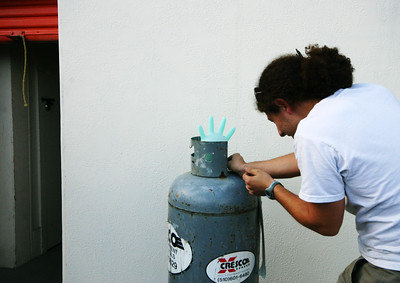Can Breathing in Propane Hurt You? Definitely. Even in small amount, it can severely affect your body and lungs. In large amount, it can you to pass out and eventually, and cause serious damage.
Propane is a gas that is commonly used for heating and cooking. While it is a safe gas to use, it can be dangerous if it is breathed in. Propane can hurt your lungs and cause dizziness, headaches, and nausea. If you smell propane, you should open a window and leave the area immediately. If you are using propane, make sure that you are in a well-ventilated area.

What is propane?
Propane is a gas that is used in many different ways. It is used in gas grills, camp stoves, and lanterns. It is also used as a fuel for some vehicles. Propane is a very flammable gas and can be explosive if it is not used properly. If you breathe in propane, it can hurt you. Propane is made up of carbon and hydrogen. When you breathe in propane, the carbon dioxide can replace the oxygen in your blood. This can cause you to pass out and can be fatal.
If you inhale propane, it can cause asphyxiation. Inhaling propane can also cause chemical pneumonitis, which is an inflammation of the lungs. Propane is a gas that is heavier than air, so it can accumulate in enclosed spaces and lead to asphyxiation. If you are in an enclosed space and inhale propane, you may not be able to get enough oxygen, and you could die.
Propane is an inert gas, so it will displace the oxygen in your lungs and prevent you from breathing. If you are exposed to high levels of propane, it can also cause frostbite, because propane is a cold gas.

Here’s How Propane Fumes Can Hurt You
Exposure Routes to Propane
- Inhalation:
- The Primary Concern: Breathing in propane is the most common and concerning way people get exposed. Propane is heavier than air, so it tends to settle in low-lying areas, which can increase the risk of inhalation if a leak occurs near the ground or in a confined space.
- Effects: Inhaling propane can lead to symptoms like dizziness, headaches, nausea, and difficulty breathing. In high concentrations, it can displace oxygen, leading to potential asphyxiation.
2. Skin Contact:
- Liquid Propane: If propane in its liquid form comes into contact with the skin, it can cause cold burns or frostbite. This is because propane, under pressure in tanks, is extremely cold.
- Effects: Direct skin contact with liquid propane can lead to skin damage, pain, swelling, and blisters.
3. Ingestion:
- Rare but Dangerous: Ingesting propane is rare, primarily because of its gaseous state at room temperature. However, if someone were to ingest liquid propane (extremely unlikely in everyday circumstances), it could cause significant internal harm.
- Effects: Ingesting propane can lead to internal cold burns, damage to the digestive system, and respiratory distress if it vaporizes and expands inside the body.
While inhalation is the most common exposure route for propane, it’s crucial to be aware of the risks associated with skin contact and ingestion. Proper storage, handling, and usage can mitigate these risks, ensuring safety when using propane.
What happens if you inhale a little bit and a large amount of propane
If you inhale a little bit of propane, you may experience some short-term effects, such as dizziness, headache, nausea, and vomiting.
If you take a deep breath of propane, it will initially stimulate your respiratory system and make you feel more awake. However, too much propane can cause asphyxiation and death.
If you accidently inhale a small amount of propane, it is not likely to cause any serious health effects. However, you may experience some minor side effects. If you experience any of these symptoms, try to get some fresh air and rest until they subside. If they persist or become severe, seek medical attention immediately.
If you inhale a large amount of propane, it can cause asphyxiation. This is because propane is an asphyxiant gas. When inhaled, it displaces oxygen in the lungs and prevents the body from being able to get the oxygen it needs. This can cause unconsciousness and even death.
Immediate Health Effects of Breathing in Propane
1. Oxygen Displacement and Risk of Asphyxiation:
- What It Means for You: When you breathe in a lot of propane, it can take up the space meant for oxygen in your lungs. This makes it harder for your body to get the oxygen it needs, which can lead to asphyxiation.
- How You Might Feel: You could feel dizzy, confused, or even faint if there’s not enough oxygen.
2. Symptoms You Might Experience:
- Dizziness: Propane inhalation might make you feel like the room is spinning.
- Headaches: Breathing in propane can give you a headache.
- Shortness of Breath: You might find it hard to catch your breath.
- Confusion: It could become challenging to think clearly or concentrate.
- Nausea: You might feel like you’re going to throw up.
3. The Chill from Propane Leaks:
- Why Propane Feels Cold: When propane leaks from its storage, it’s super cold because it’s usually in a liquid state under pressure.
- How It Affects You: If propane, especially in its cold liquid form, touches your skin, it can cause frostbite or cold burns. If you breathe it in, the cold air might make you cough or wheeze.
If you think you’ve inhaled propane or been exposed to a leak, get to fresh air immediately. If your symptoms are bad or don’t go away, you should seek medical attention. Remember, it’s always best to be safe around propane. Read this guideline.
Propane exposure limits
The airborne exposure limit (REL) for propane is 1,000 ppm averaged over a 10-hour workshift. This means that the average concentration of propane in the air during a 10-hour work shift should not exceed 1,000 ppm. If the concentration of propane in the air exceeds this limit, it can be unsafe to breathe and can cause health problems.
If the concentration of propane in the air exceeds this limit, the worker must be removed from the area and given respiratory protection until the level of propane in the air has dropped below the exposure limit.
What are the signs of propane poisoning?
The signs of propane poisoning can be divided into three main categories: physical, mental, and emotional. Physical signs of propane poisoning include: headaches, dizziness, nausea, vomiting, chest pain, shortness of breath, and increased heart rate. Mental signs of propane poisoning include: confusion, disorientation, impaired judgment, and memory loss. Emotional signs of propane poisoning include: anxiety, fearfulness, and panic.
The most common symptoms of propane poisoning are headache, dizziness, nausea, and vomiting. More serious symptoms can include loss of consciousness, convulsions, and respiratory failure. If you suspect that you or someone else has been poisoned by propane, it is important to seek medical attention immediately.
How long does it take to get propane poisoning?
When it comes to propane poisoning, the answer to how long it takes to get sick can vary depending on the amount of exposure and individual factors. However, according to the Mayo Clinic, exposure to high levels of propane can result in asphyxiation within minutes. Symptoms of propane poisoning include dizziness, headaches, nausea, and vomiting. If you or someone you know has been exposed to propane, it is important to seek medical attention immediately.
If you suspect that you or someone else has been poisoned by propane, it is important to seek medical attention immediately. The symptoms of propane poisoning can range from mild to severe, and can include headaches, dizziness, nausea, and vomiting. In severe cases, propane poisoning can lead to coma and even death.
What should you do if you think someone has been poisoned by propane?
If you believe someone has been poisoned by propane, it is important to seek medical attention immediately and call poison control. Propane is a gas that can be breathed in and can cause serious health problems. Symptoms of propane poisoning include headache, coughing, confusion, nausea, vomiting, and irregular heart beat. If not treated quickly, propane poisoning can be fatal.
If you think someone may have been poisoned by propane, it is important to act quickly and call for medical help. If the person is not breathing, start CPR immediately. If the person is conscious, try to keep them calm and still until medical help arrives. It is also important to remove any sources of propane from the area and open all doors and windows for ventilation.
If you think someone has been poisoned by propane, it is important to seek medical attention immediately. If the person is not breathing, call 911. When calling, be ready to answer the following questions:
- The victim’s age, weight, and gender
- How much propane was inhaled
- When propane inhalation occurred
- Whether the victim has any medical conditions.
Poisoning from propane can be serious and even fatal. Early treatment is critical.
How can you prevent propane poisoning?
1. Proper Storage and Handling of Propane Tanks:
- For You: Always handle propane tanks with care. Avoid dropping them or subjecting them to rough treatment.
- Storage Tips: Store propane tanks upright in a cool, well-ventilated area, away from direct sunlight or sources of heat. Don’t store them indoors or in enclosed spaces like garages.
2. Using Propane in Well-Ventilated Areas:
- Why It Matters: Propane can build up in enclosed spaces, increasing the risk of inhalation and fire.
- For You: Whenever you’re using propane, especially for cooking or heating, make sure the area has good airflow. This ensures any leaked propane disperses quickly, reducing risks.
3. Regular Maintenance and Checks for Leaks:
- The Why: Over time, equipment can wear out, which might cause leaks.
- For You: Regularly inspect your propane-using appliances. Look for signs of wear and tear, and always check for leaks. You can do a simple leak test by applying soapy water to connections; if bubbles form, there’s a leak.
4. Importance of Carbon Monoxide Detectors:
- Why It Matters: Improperly burned propane can produce carbon monoxide (CO), a dangerous gas that’s odorless and colorless.
- For Your Safety: Install carbon monoxide detectors in your home, especially if you use propane for heating or cooking. Check these detectors regularly to make sure they’re functioning and change batteries as needed.
Remember, using propane safely means being proactive about potential risks. By following these best practices, you can enjoy the benefits of propane while ensuring your safety and the safety of those around you.
Factors Affecting the Severity of Health Impacts from Propane Exposure
1. Concentration of Inhaled Propane:
- The Higher, The Riskier: The amount of propane in the air you’re breathing directly influences the severity of health effects. High concentrations of propane can lead to rapid oxygen displacement in your lungs, making it harder to breathe.
- Effects: In areas with high propane concentrations, you may experience more severe symptoms like confusion, loss of consciousness, and even asphyxiation more quickly than in areas with lower concentrations.
2. Duration of Exposure:
- Time Matters: The longer you’re exposed to propane, the more severe the health effects can become. Short-term exposure might lead to mild symptoms like dizziness or a headache, while prolonged exposure can exacerbate these symptoms and introduce more serious concerns.
- Effects: Prolonged exposure can compound the effects of reduced oxygen, leading to heightened confusion, more intense headaches, difficulty breathing, and an increased risk of long-term health consequences.
3. Individual Susceptibility:
- Everyone’s Different: Personal health factors play a role in how propane affects you. People with pre-existing health conditions, especially respiratory illnesses, might be more sensitive to propane exposure.
- Effects: If you have respiratory conditions like asthma or COPD, you might experience symptoms at lower propane concentrations compared to someone without these conditions. Additionally, elderly individuals, children, or those with weakened immune systems might also be more vulnerable to propane’s effects.
What are the long-term effects of breathing in propane?
When inhaled, propane can have several short- and long-term effects on your health. In the short-term, propane can cause asphyxiation (loss of consciousness due to lack of oxygen), and in high concentrations, it can lead to death. It can also cause burns to the throat and lungs. Inhalation of lower concentrations can cause dizziness, headaches, and nausea. Long-term effects of propane inhalation can include damage to the nervous system, liver, and kidneys. Additionally, chronic propane inhalation can lead to an increased risk of cancer.
Are there any other risks associated with propane?
Inhaling propane can lead to suffocation because it displaces oxygen in the lungs and prevents the body from properly breathing. Inhaling high concentrations of propane can also lead to dizziness, headaches, and nausea. Prolonged exposure to propane can cause neurological damage and death.
Another risk is asphyxiation. Propane is heavier than air, so if it leaks, it can settle in low areas and displace oxygen. This can lead to asphyxiation, which can be fatal. Finally, propane can be toxic if inhaled in large quantities. Propane is not poisonous, but it can cause dizziness, nausea, and vomiting if inhaled in large amounts. If you think you may have inhaled too much propane, get to fresh air immediately and seek medical attention.
What to Do if You Suspect Propane Inhalation
1. Get to Fresh Air:
- If you think you’ve inhaled propane, immediately go outside or to a well-ventilated area. Open windows and doors if you’re indoors.
2. Turn off the Propane Source:
- If it’s safe, shut off the source of the leak. This could be turning a knob or valve.
3. Avoid Flames and Sparks:
- Propane is flammable. Don’t light anything, and avoid using electrical devices until you’re sure there’s no propane around.
4. Check Yourself:
- Notice how you feel. Dizziness, headaches, or trouble breathing? These could be signs you’ve inhaled propane.
5. When and Why to Seek Medical Attention:
- When? If you’re feeling really bad, can’t breathe properly, or your symptoms last a long time.
- Why? Breathing in too much propane can be harmful. Doctors can help treat the symptoms and make sure you’re okay.
6. Basic First Aid:
- Stay Calm: Panicking can make things worse. Take deep breaths and try to relax.
- Breathe: If you’re struggling to breathe or someone with you is, loosen any tight clothing.
- Stay Warm: If propane made contact with your skin, you might feel cold. Warm up, but don’t put direct heat on the cold areas.
- Have Someone with You: Symptoms can sometimes show up later. It’s good to have someone around to keep an eye on things.
Always remember, if you’re around propane, know the risks and be safe. If something does happen, acting quickly can make all the difference.
Conclusion
Propane, while beneficial in many applications, comes with its set of risks. It’s crucial to always be conscious of these risks and prioritize safety above all else. By being proactive, taking the necessary precautions, and staying educated about the signs and symptoms of propane inhalation and exposure, you can ensure a safer environment for yourself and those around you.

Mike is an experienced propane technician with over 15 years of professional experience in the field. He has dedicated his career to helping customers with their propane needs, from installation to maintenance and repair. Together with Jeremy, he co-founded this website to provide useful information and guidance to customers seeking reliable propane services.







